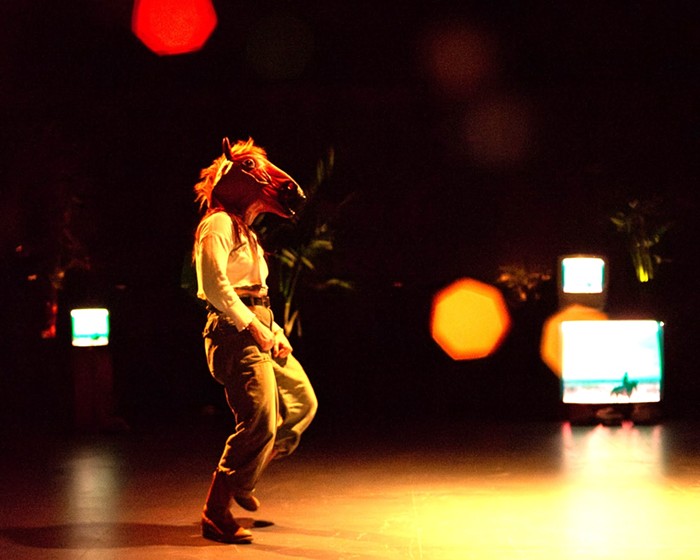REAL TALK: I'm not one for Chekhov jokes, so I was prepared to dislike Vanya and Sonia and Masha and Spike, Christopher Durang's Tony-winning play now showing at Portland Center Stage. This may be a personal failing of mine, but I generally have a bad attitude about theater that gets too self-referential; it feels like being winked at repeatedly when you're just trying to have a normal conversation with someone.
So I'm happy, then, to report that PCS' production is much more than a two-and-a-half-hour wink-off. The Chekhov references are there, sure, but they're the price of admission for a much larger, more interesting story that's heartwarming in a Wes Anderson sort of way—meaning the characters are WASPy, maladjusted adults, and the play is a lengthy, painful catalyst for (very slight) personal growth.
The titular Vanya and Sonia (Andrew Sellon and Sharonlee McLean, respectively) are adult siblings entering late middle age, without much to show for it. Having spent their young adulthoods caring for their ill, aging parents, they now find themselves entering honored-citizen territory with no jobs and no families, and their only contact with the world outside the childhood home where they still live is with their housekeeper, Cassandra (Olivia Negron). And even the childhood home isn't theirs—it belongs to Masha (Carol Halstead), their sister, who's had a successful acting career, and is (mostly) out of the picture.
Vanya, who is gay and apparently closeted, and Sonia, who, like a self-flagellating Margot Tenenbaum, frequently reminds everyone that she's adopted, live in companionable-enough isolation with an undercurrent of abject despair, until their routine is soundly interrupted by the arrival of Masha, toting a Disney Snow White costume and Spike, her young boyfriend who's got prominent abs and the personality of a post (Nick Ballard). Ever the control freak, Masha forces her siblings to join her at a costume party, and all the wounds of the past come out to play.
The casting in this production is excellent, starting with Sellon, who plays the reserved Vanya with quiet resignation, occasionally interrupted by disarming charm and excitability. Though Sonia is a character who is, by nature, whiny, McLean inhabits her misery in a goofy, Eeyore-like way, as if she's followed perpetually by a sad trombone, and when she casts it off, drunkenly, pretending to be Maggie Smith, it's a wonderful moment. Halstead, too, has a role that could read just as a mean girl entering late middle age. But as the play progresses, and her veneer fades, it becomes clear that she's just as damaged and lonely as her siblings, and just as afraid of getting older. Ballard's basically playing abs, but he makes it work.
Admittedly, Durang's script has some issues. I could've done without a lengthy, rambling, "You kids, get off my lawn!" style lecture from Vanya on the value of postage stamps and the demise of good manners and the horrors of Twitter and texting. It's clear that this particular monologue is intended as a melancholy meditation on aging and the passage of time, but I found it to be one of the play's weakest, least effective moments, even in the hands of an actor as capable as Sellon.
And as much as it makes me feel like a broken record to say it, the amount of fun Durang seems to get out of his jokes about Vanya and Sonia's voodoo-practicing, prophesy-spewing housekeeper is a low point. In a play so full of idiosyncratic, nuanced characters, Durang seems to be congratulating himself for under-writing one of them. Let me be clear: I mean this as a criticism of Durang's lazy writing, not Negron, whose funny, smart portrayal of Cassandra transforms a limited role into something way more interesting.
Another actor who breaks through the confines of an under-written role is Eden Malyn, who has an upcoming arc on Orange Is the New Black. Malyn plays Nina, the niece of Sonia and Vanya's neighbor, who it seems was written for that string of sentient leaves on Flower, as wispy and insubstantial. Malyn's Nina, however, is a crazy-voiced, discerning, incredibly earnest character, whose obsessions with Ingmar Bergman and The Seagull read like genuine preoccupations; as written, they scream manic pixie dream girl. Actresses shouldn't have to overcome the confines of caricature-ish roles. That's one reason I'm not sure that Vanya, Et Al. was wholly deserving of its Tony, but I can say with greater confidence that this production's worth a visit.



















